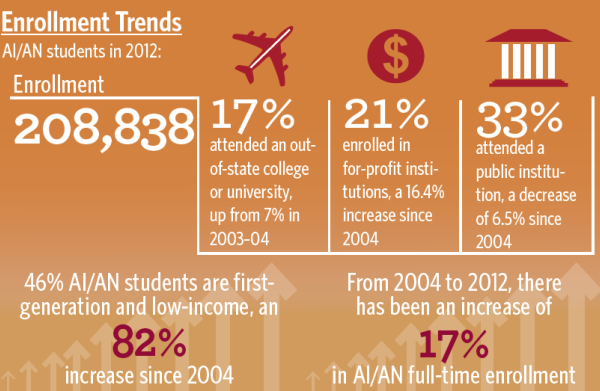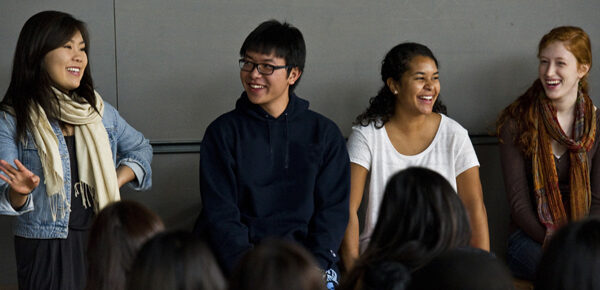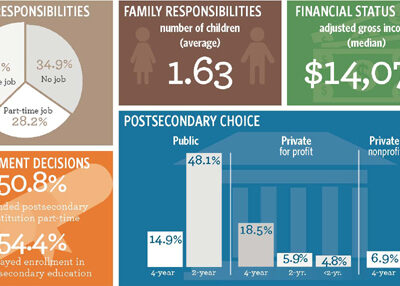Features

Mapping New Pathways for Native Youth
While 208,838 American Indian and Alaska Native students were enrolled in college in 2012—a 17 percent increase from 2004—46 percent are first-generation and low-income, a population that often struggles with college completion. As the White House gears up for the first Tribal Youth Gathering, Christine Nelson looks at efforts to expand higher education opportunities for these students.

Opening Cuba and the World to Webster University Students
On Dec. 17, 2014, President Obama announced that he was restoring full diplomatic relations with Cuba, a historic decision that is ending over 50 years of frozen relations. Higher education has been one of the main beneficiaries of these early efforts. Beth Stroble, president of Webster University in Missouri, explores the future for continued cooperation between U.S. and Cuban institutions.

How to Explode a Myth: Reshaping the Conversation About the Liberal Arts
Higher education leaders are living and leading in the context of increased public scrutiny, demands for greater public accountability, and a “new normal” of constrained resources. Educational leaders must redouble our efforts to clarify the essential components of a high-quality college degree and provide evidence on that oft-repeated and anxiety-generated question: Is college really worth it?
Joint and Dual Degree Programs Gain Steam Worldwide
ACE’s Center for Internationalization and Global Engagement’s 2014 report, Mapping International Joint and Dual Degrees: U.S. Program Profiles and Perspectives explores the landscape of such programs in the United States, including characteristics and policies, academic focus areas, partner locations and programmatic challenges, and their role in broader institutional strategy and planning.

Will Performance-Based Funding Further Disadvantage Disadvantaged Students?
Performance-based funding (PBF) is becoming increasingly popular as an accountability tool to reward higher education institutions for specific student outcomes. Despite its popularity, however, a substantial body of empirical evidence shows PBF can have troubling and unintended impacts. With this in mind, Lyle McKinney and Linda Serra Hagedorn look at the Texas Student Success Points Model.

Where Are the Women in STEM?
From decades of widely reported and debated research, we know that women have been enrolling in and graduating from college in greater numbers than men since the 1980s. But there is one area where the increased presence of women is notably missing—the so-called STEM fields: with the greatest disparities occurring in the important fields of engineering and computer science.

Going International
For many United States colleges and universities, increasing international student enrollment has become a strategic priority. Such students often pay full tuition, and amid state funding and other cutbacks, admissions offices are increasingly reaching across national borders in their recruiting campaigns. But that’s not the only reason to go international, writes Robin Matross Helms.
From Access to Graduation: Supporting Post-9/11 Undergraduate Student Veterans
Given the huge investment in veterans’ postsecondary education represented by the Post-9/11 GI Bill, one could argue that veterans who use this generous benefit are in a good position to enroll in college and ultimately earn a postsecondary certificate or degree. And some do. But for veterans who didn’t finish college, what were the barriers to their success?
General Education, the Four-Year Degree and Employment: What Needs to Change?
Which segment of the four-year degree is supposed to enhance students’ employable skills and prepare them for a job? Most would probably think, the courses in their degree major. But increasingly, employers are saying they can train employees in the specialized technical skills associated with their jobs. It’s the intangible skills that they hope will be taught by colleges and universities.

Who’s Missing From This Picture? Single Parent Students
The estimated 3.5 million students who also are single parents are almost always absent from the conversation surrounding higher education. These post-traditional learners now make up 15.2 percent of the undergraduate population, and their numbers are growing. Christopher J. Nellum and Mekaelia Davis discuss the importance of considering their needs.
Will the TEACH Act Make Higher Education More Accessible?
Colleges and universities are committed to creating the best possible learning experience for all of their students. In the case of students with disabilities, this means providing accessible campuses and learning materials that support their education. Meeting these goals can be challenging, but we believe that institutions working together with students can determine the best course of action.

Dear Colleague…
Sexual assault at colleges and universities is a serious problem. Protecting students is paramount to the mission of all institutions, and we know that sometimes we fail. But to help achieve real change, the federal government must partner with the higher education community on a single, clear set of federal requirements in this area.